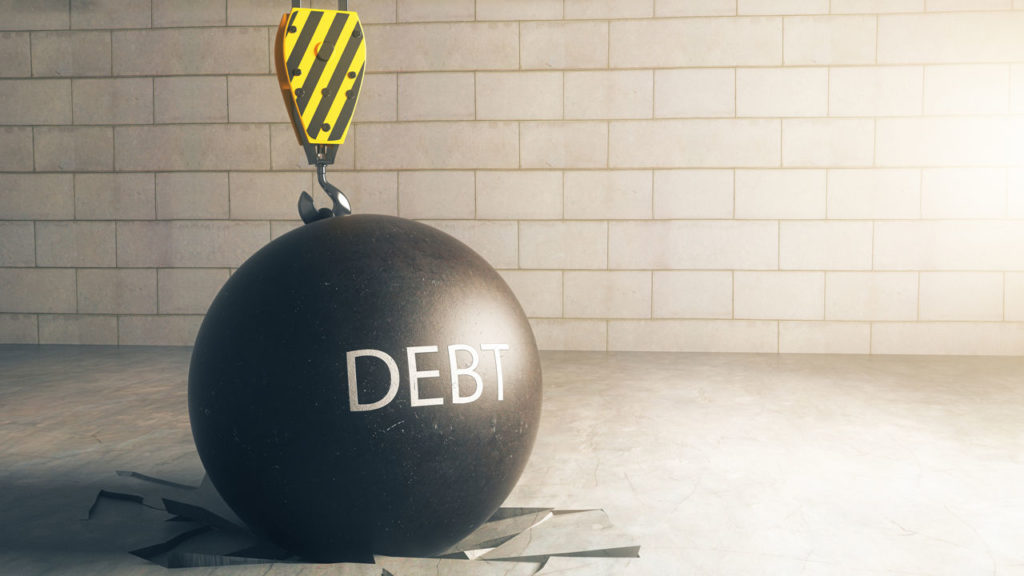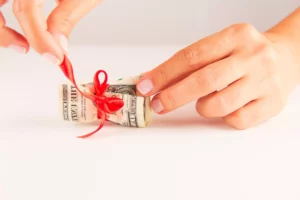Shanile felt the warm sun as she relaxed outside the café and sipped her green tea with two packets of sugar (chunky raw sugar is natural and doesn’t really count, right?). She took a deep breath and let it out…but it caught in her throat. Shanile felt a tug in her spirit. Ugh. “Why doesn’t this feel better?”
Shanile had landed the job of her dreams nearly a year earlier. At last, she felt as if she’d come up for air after being submerged for way too long. She started to live the life she’d held her breath for — a condo instead of an apartment, organic instead of store brand, designer clothes instead of Ross, and trips to a couple of the places she’d pinned to her “Someday” board.
But as she pumped the straw up and down in her morning treat, she knew the tea (and the two sugars) was not the source of her stomach pain. Shanile was drowning in debt.
The Debt Trap
Debt is not evil. But we’d be living in a land of glitter and unicorns if we didn’t admit that debt causes problems. When we accumulate debt — particularly for items we don’t really need — our finances begin to call the shots.
Debt tells you, “Stay in a dead-end job; you can’t afford to explore.” Debt worries that taking time off for a missions trip is a costly mistake. Debt suffocates your chance to begin burden-free in this new relationship that may actually go somewhere.
In fact, Proverbs is pretty blunt: “The rich rules over the poor, and the borrower is the slave of the lender.” (Proverbs 22:7)
No wonder Shanile’s stomach hurts. No one wants to be a slave. And if we had our way, we’d rather not marry a slave, either.
A Better Way Forward
Still not convinced? Consider these four reasons why avoiding debt will both help you now and prepare you for a happier future.
1. You start with a clean slate. Whether you’re pursuing a new relationship or a new job opportunity, starting out debt-free expands your options.
The concept of “getting your financial house in order,” is a great mental picture. A messy house feels chaotic. A house with laundry supplies in the kitchen and plates and bowls above the washer and dryer is disorganized, and stressful living is almost guaranteed. A messy financial house is the same.
If your money is in order and you aren’t buried in piles of debt, you are more likely to live peacefully. Plus, when it comes time to pursue a relationship, you can start with a clean slate rather than being weighed down by debt.
2. You are able to go where God leads. When you are in debt, a lack of funds can start to dictate your life. Want to change jobs? Visit a sick friend? Start a non-profit? Travel? Debt starts to call the shots and say “no” to all of these things.
Think of the joyful, weightless feel of being able to respond to God’s leading without the interference of nagging debt. Would Peter and Andrew have dropped their nets and followed Jesus if they’d racked up too much credit card debt on fishing boats and water skis? Let’s hope so. But don’t give debt the ability to determine your next steps.
3. You avoid future marital stress. When a relationship starts, there are so many fun things to talk about that money does not usually rank for most couples. Discussing money can feel boring, too personal, or unnecessary. You love the person, right? So does it matter if she is on solid financial footing?
Yes, it does.
When you marry, your spouse’s debt becomes yours and vice versa. Research reinforces that debt negatively affects marriages. A study by the National Marriage Project found “people who remain debt free in marriage are the most likely to stay together.”
Why? Money worries cause stress, and stress causes fights. The study says “consumer debt fuels a sense of financial unease among couples, and increases the likelihood that they will fight over money matters.”
And because we make money decisions every day of our life (premium gas or the cheap stuff, coffee at home or the drive-thru, apartment or house), couples in debt have the potential to fight about money every single day. While we wouldn’t say debt is necessarily a deal-breaker or character flaw, traveling through life together with little to no debt minimizes stress in the relationship.
4. You avoid a life weighed down with too much stuff. Most of the studies on debt focus on the borrower’s financial repercussions. They talk about the vicious cycle of growing debt when the borrower is unable to pay the balance in full each month on a credit card. It’s all about dollars and cents.
But we would be wise to take a big step back and ask, Why do I have this debt? Why did I think I needed so many items I couldn’t afford? Am I living beyond my means?
Do I laugh at the phrase “keeping up with the Joneses” while unknowingly trying to keep up with “the Jennifer” in the office or on social media? Am I making impulse purchases, or do I have a plan for what I buy? Do I really need an apartment, car or wardrobe that impresses others?
Matthew 6:19-21 delivers some wise words:
“Do not lay up for yourselves treasures on earth, where moth and rust destroy and where thieves break in and steal, but lay up for yourselves treasures in heaven, where neither moth nor rust destroys and where thieves do not break in and steal. For where your treasure is, there your heart will be also.”
Having too much stuff, especially when you’re still paying for it, can become a heavy burden that turns your mind away from the things of heaven to the things of earth.
Reclaiming Your Financial Future
Maybe you’re saying, “OK. I want to get out of debt. What do I do?”
First, pat yourself on the back for caring enough to press pause on your current spending habits and consider doing life a different way. Remember that it’s just money. You can make more over time. And God can help you stay true to a spending plan that eliminates further unnecessary debt in your life.
Next, brainstorm ways you can reduce your spending to head off debt. Jot down some ideas that might work for you. List all ideas that come to mind and then go back and circle the winners.
Could you:
- Add a roommate?
- Rent out a room?
- Limit dining out?
- Cancel your two-day shipping membership?
- Shorten your next trip by a couple of days?
- Stow away your credit cards?
- Change it up with friends and suggest a walk instead of expensive dinners or coffee?
- Borrow a dress for your next function instead of buying one?
- Start looking for a better-paying job?
- Hustle a second job on weekends or evenings, tutoring, babysitting or working retail?
Once you’ve brainstormed how to save money, use one of the many free and friendly apps out there to create a budget and track where your money goes. Mint is a very popular money management tool that’s been around since 2006. It helps you stay on top of your finances so you understand where your money goes and where you can cut back. It automatically categorizes your spending so you can see exactly how much you spend at the drive-thru, online and on those killer “sales” at the store. Plus, you get alerts when your spending goes over.
Some apps such as BillGuard allow you to track your purchases one by one and cut down on potential fraud. With this app, you review each transaction by swiping right or left to “approve” or “flag” it. This way you see your expenses up close and personal, and as some smart person once said, “Knowledge is power.”
You can do this. Tackling debt may not feel like a party at first, but you will certainly have reasons to celebrate when you see your future growing in the right direction. God has big plans for your life. Plans that may require a pivot or a change made without the “cement boots” of debt.
Copyright 2017 Scott and Bethany Palmer. All rights reserved.












